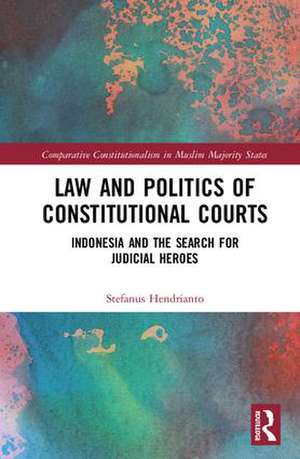Law and Politics of Constitutional Courts: Indonesia and the Search for Judicial Heroes: Comparative Constitutionalism in Muslim Majority States
Autor Stefanus Hendriantoen Limba Engleză Hardback – 5 apr 2018
| Toate formatele și edițiile | Preț | Express |
|---|---|---|
| Paperback (1) | 389.66 lei 6-8 săpt. | |
| Taylor & Francis – 14 aug 2020 | 389.66 lei 6-8 săpt. | |
| Hardback (1) | 1005.48 lei 6-8 săpt. | |
| Taylor & Francis – 5 apr 2018 | 1005.48 lei 6-8 săpt. |
Preț: 1005.48 lei
Preț vechi: 1226.20 lei
-18% Nou
Puncte Express: 1508
Preț estimativ în valută:
192.40€ • 201.29$ • 159.83£
192.40€ • 201.29$ • 159.83£
Carte tipărită la comandă
Livrare economică 02-16 aprilie
Preluare comenzi: 021 569.72.76
Specificații
ISBN-13: 9781138296428
ISBN-10: 1138296422
Pagini: 312
Ilustrații: 4 Tables, black and white
Dimensiuni: 156 x 234 x 19 mm
Greutate: 0.6 kg
Ediția:1
Editura: Taylor & Francis
Colecția Routledge
Seria Comparative Constitutionalism in Muslim Majority States
Locul publicării:Oxford, United Kingdom
ISBN-10: 1138296422
Pagini: 312
Ilustrații: 4 Tables, black and white
Dimensiuni: 156 x 234 x 19 mm
Greutate: 0.6 kg
Ediția:1
Editura: Taylor & Francis
Colecția Routledge
Seria Comparative Constitutionalism in Muslim Majority States
Locul publicării:Oxford, United Kingdom
Public țintă
PostgraduateCuprins
Part I: Foundations
Introduction; 1. Theorizing Judicial Heroes;
Part II: The First Generation Court
2. The Birth of the Constitutional Court: A Joke that turned Serious; 3. A Heroic Intellectual Leadership; 4. (Un)Heroic Quasi-Weak-Form Review; 5. A Heroic Social Leadership;
Part III: The Second Generation Court
6. After the Heroic Court: The Second Generation Decline? 7. Miscarriage of Chief Justices: The Anti-Heroes; 8: A Good Hero is Hard to Find: Towards a Less Heroic Court?
Part IV: Conclusions
9. Conclusion: The "Heroic Judicial Leadership" and "Second Generation Decline" in Comparative Perspective.
Introduction; 1. Theorizing Judicial Heroes;
Part II: The First Generation Court
2. The Birth of the Constitutional Court: A Joke that turned Serious; 3. A Heroic Intellectual Leadership; 4. (Un)Heroic Quasi-Weak-Form Review; 5. A Heroic Social Leadership;
Part III: The Second Generation Court
6. After the Heroic Court: The Second Generation Decline? 7. Miscarriage of Chief Justices: The Anti-Heroes; 8: A Good Hero is Hard to Find: Towards a Less Heroic Court?
Part IV: Conclusions
9. Conclusion: The "Heroic Judicial Leadership" and "Second Generation Decline" in Comparative Perspective.
Notă biografică
Stefanus Hendrianto is a Jesuit and legal scholar. In recent years, he served as a visiting professor at Santa Clara University School of Law and a guest scholar at the Kellogg Institute for International Studies at the University of Notre Dame. Currently, he is a scholar at Boston College, School of Theology and Ministry. He holds a PhD degree from the University of Washington School of Law in Seattle and an LLM from Utrecht University in the Netherlands, in addition to his LLB degree from Gadjah Mada University, Indonesia.
Recenzii
'With rare exceptions, such as the courts headed by John Marshall and Earl Warren, it was not common until recently to explain the work-product of constitutional courts by focusing on their leadership. Now, however, a number of writers have begun to emphasize the importance of the chief justice in guiding courts to be bold or cautious, expansive or restrictive, in their constitutional decisions. With his extensive knowledge and with great judiciousness, Stefanus Hendrianto has examined the important role of chief justices of the Constitutional Court of Indonesia. He shows convincingly that leadership can indeed make a major difference in the emergence of constitutional doctrine, as he examines the work of the Court and compares it to similar courts elsewhere. This is an important work of comparative constitutional law and politics that will repay careful study.'Donald L. Horowitz, Duke University, USA and author of Constitutional Change and Democracy in Indonesia
'This book is a major contribution to comparative constitutional studies: it provides a crisp and authoritative account of the early jurisprudence of the Indonesian Constitutional Court, a highly active and creative court operating in one of the world's largest democracies. It also offers a fascinating account of the role of Chief Justice Jimly Assidique, as the leader of that court, and in doing so makes an important contribution to broader debates about the role of constitutional judges – and different styles of constitutional judging – in the consolidation of constitutional democracy.'
Rosalind Dixon, UNSW Sydney, Australia
'This fascinating study of the Indonesian Constitutional Court introduces an entirely new concept for understanding judicial power: the judge as a heroic figure. Providing an exhaustive account of the Court’s successes and failures, Hendrianto makes a powerful case for the role of judicial
'This book is a major contribution to comparative constitutional studies: it provides a crisp and authoritative account of the early jurisprudence of the Indonesian Constitutional Court, a highly active and creative court operating in one of the world's largest democracies. It also offers a fascinating account of the role of Chief Justice Jimly Assidique, as the leader of that court, and in doing so makes an important contribution to broader debates about the role of constitutional judges – and different styles of constitutional judging – in the consolidation of constitutional democracy.'
Rosalind Dixon, UNSW Sydney, Australia
'This fascinating study of the Indonesian Constitutional Court introduces an entirely new concept for understanding judicial power: the judge as a heroic figure. Providing an exhaustive account of the Court’s successes and failures, Hendrianto makes a powerful case for the role of judicial
Descriere
This book critically evaluates different models of judicial leadership in Indonesia to examine the impact that individual chief justices can have on the development of constitutional courts. Drawing on Greek mythology and the established idea of judicial heroes to explore the types of leadership that judges can exercise, it illustrates how Indonesia’s recent experience offers a stark contrast between the different models. It will be a valuable resource for those interested in the law and politics of Indonesia, comparative constitutional law and comparative judicial politics.



